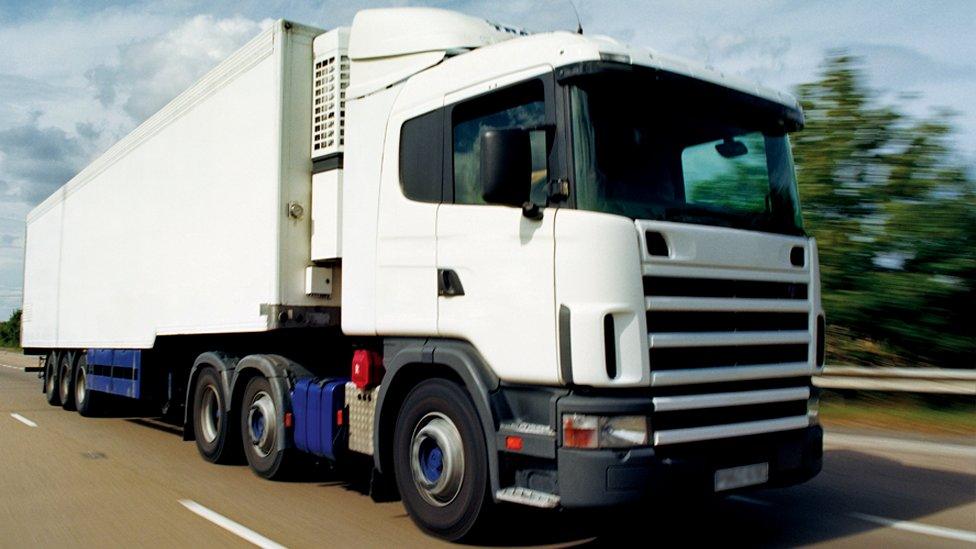Price of chicken set to rise, UK's largest supplier warns
- Published
- comments
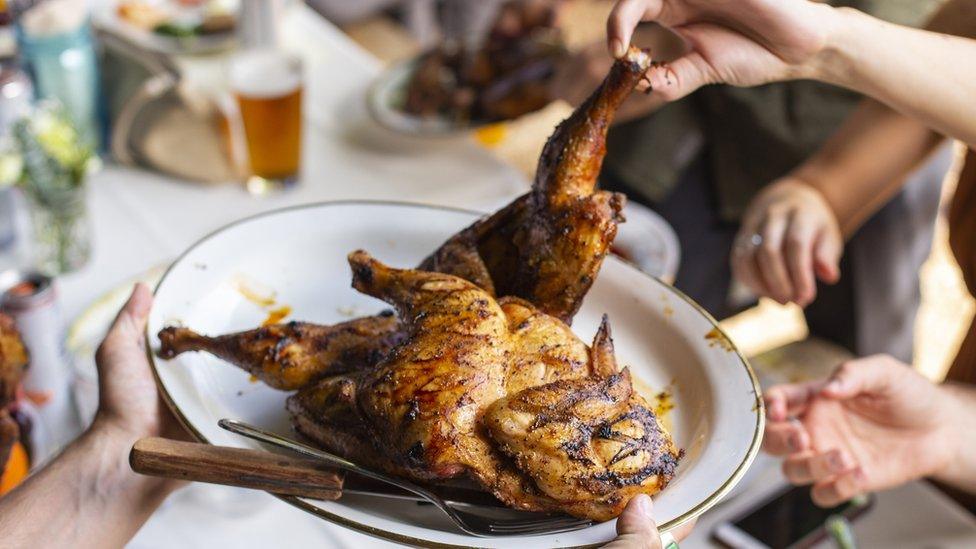
The UK's largest poultry seller has warned that the price of chicken is set to rise because of supply chain problems.
The chief executive of 2 Sisters Food Group, Ronald Kers, said that "in reality food is too cheap".
Mr Kers told the BBC that the price of chicken, the UK's most popular meat, should be higher to reflect the extra costs the business is facing.
The firm has 600 farms and 16 factories across the UK.
Mr Kers told the BBC's Today programme that the company has had to cope with additional costs because of Brexit, Covid, labour shortages and logistics issues.
He added that the "significant" inflated costs of packaging, energy and CO2 were also "bulking up the price of food".
On Wednesday, the founder of 2 Sisters Food Group, Ranjit Boparan, warned that chicken prices would rise by 10%.
"How can it be right that a whole chicken costs less than a pint of beer?" he said.
Mr Boparan said the days of low prices were "coming to an end" and that "transparent, honest pricing" was needed because of mounting costs.
The company has seen its CO2 costs rise by more than 500% in three weeks, while energy costs have increased by more than 450% from a year earlier.
It also said feed costs at farms have risen by 15%, with commodity costs in the farming process also up by around 20%.
Speaking to the BBC, Mr Kers said: "If you look at the price of chicken now it is £3.50, while a decade ago it was £5 - it should have gone up.
"People on farms are struggling - we don't have enough people on our factories, farms or enough HGV drivers and as a result we're seeing empty shelves and reduced choice," he continued.
"There's no margin in the whole supply chain".
The government's visa scheme for short-term workers meant the company was able to bring in an additional 700 people to secure the volume they needed for Christmas, but Mr Kers said the scheme came "a little too late and a little too short".
2 Sisters sells 60% of all turkeys in the country and while Mr Kers said the overall supply chain was "clearly very fragile", he advised shoppers to buy "normally".
The firm produces about a third of all the poultry products consumed in the UK and processes more than 10 million birds each week.

Labour shortage 'catastrophic'
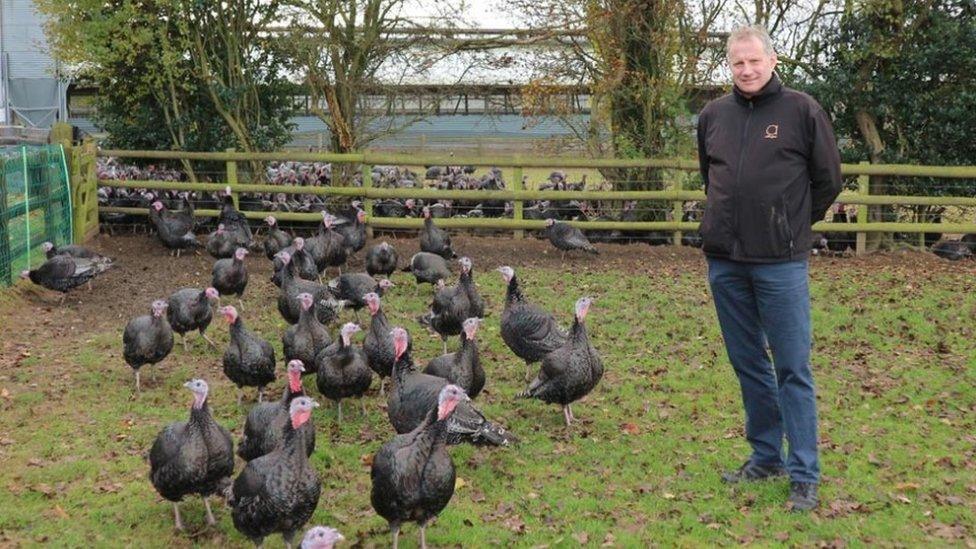
Rod Adlington at the farm in Coventry
Chicken and turkey farmer Rod Adlington, owner of Adlington Ltd, shares Mr Boparan's concerns and has already had to raise the price of his chickens by 8%.
"We've never ever had to put through a price rise before, but if we don't make these changes we just won't be here in six months," he told the BBC.
The company, based in Coventry, sells premium free range chickens retailing at between £15-£20. It sells about 2,000 chickens a week and 10,000 turkeys each Christmas.
The price of chicken feed has gone up by 20%, and the business has also been hit by higher energy bills and CO2 prices.
To help deal with the labour shortage, the firm has put up wages by 10-15%. But Mr Adlington says there is still not enough staff.
"The labour issue is catastrophic at the moment, we just have no people for the factories," he says.
"There's an awful lot of pressure on us and we just can't take it. We need to find a way out of the labour problems."

Knock on effect
Edward Cayton owns Peck and Yard chicken shop, which has two branches in Manchester and sells 550 kilo of chicken per week.
He said prices rises have "already had a knock-on effect". The firm, which was Manchester's first Asian chicken shop, has had to pay £4-£4.5 per kilo of chicken breast that would have usually cost £2.
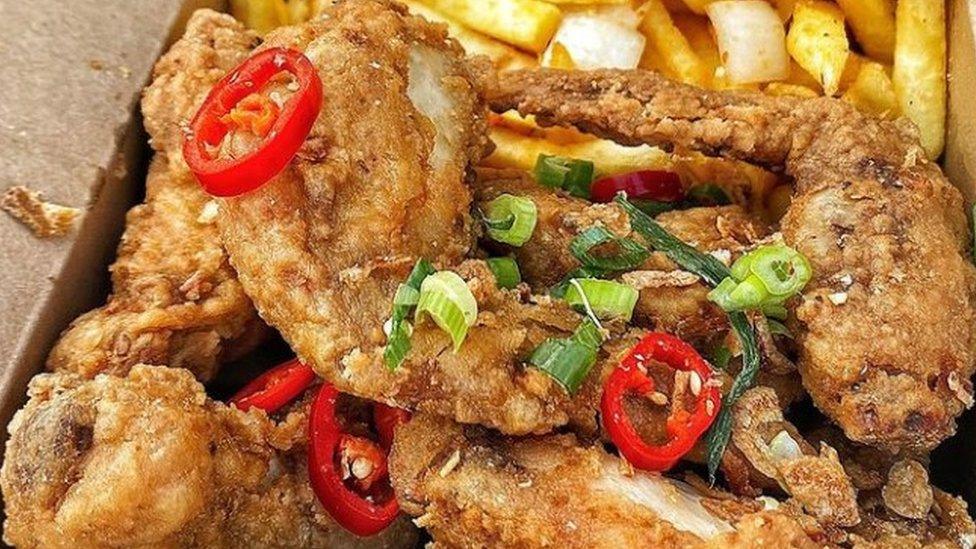
Mr Cayton said thigh pieces are also up by a third and wings, which usually cost £2.5 from his supplier, have risen to £3.5 per kilo.
"We can't raise menu prices because no one would pay much more for chicken and I can't reduce staff so the cost is having to come out of our margins".
"We just have to do more marketing and encourage people to go out to absorb the increases".
Foreign HGV drivers
One of the key factors affecting the supply chain recently has been the shortage of HGV drivers.
The shortage has been blamed on a combination of factors, including the coronavirus pandemic, Brexit and tax changes.
At the end of September, the government announced that it would allow 4,700 visas for HGV drivers to deliver food.
However, the first foreign HGV food drivers might not be in the country for another month, according to a source with close knowledge of the process.
Under the scheme - which is separate to that for HGV fuel drivers - drivers can work in the UK until 28 February.
The visa scheme opened for applications on Monday. The Home Office has not confirmed the number of visas that have been applied for so far, but several agencies that are recruiting the drivers told the BBC that they were yet to apply for them.
When the visa was announced there was concern from some in the industry that it was too short and would not attract drivers.
"The issue is the shortage of HGV drivers across Europe," said one source. "Offers need to be attractive to encourage drivers to come."
Related topics
- Published14 October 2021
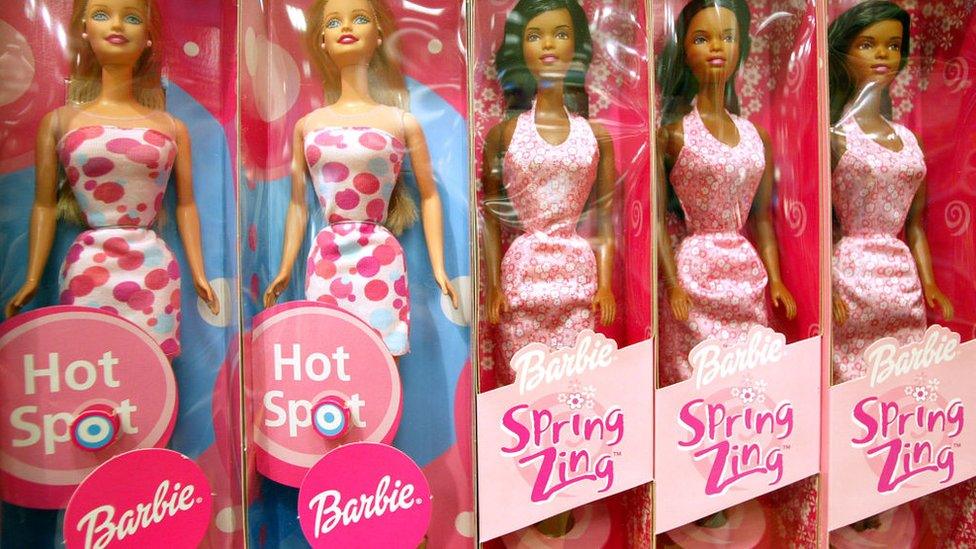
- Published15 October 2021
